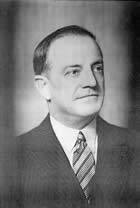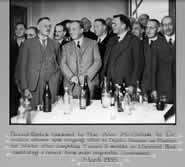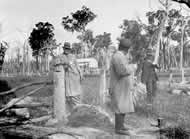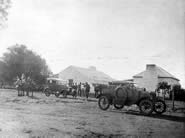
In a move that surprised his friends and colleagues, McCallum left Parliament in March 1935 to take up the post of Chairman of the Agricultural Bank.
Mr A McCallum, Minister for Works, has been selected to be chairman of the new board of commissioners which will be charged with a re-organisation of the Agricultural Bank under the Act passed by Parliament in December following upon the sensational report by the Royal Commission which investigated the bank's affairs... Mr McCallum's retirement from the Ministry comes as a profound surprise to political circles. The Cabinet, while loath to release him, was actuated by the idea of appointing the best man for the formidable task of reconstructing the bank.
'New Bank Board. Mr McCallum chairman', West Australian, 7 March 1935 [1]
Perhaps McCallum was unwilling to continue the heavy work load of supporting Premier Collier without any indication that he would attain the premiership himself [2] or perhaps the constant demands on him as Minister and MLA led him to look for a change of career. A letter written to his son, Don, who was then in London, gives some insight into McCallum's frame of mind at the time.
The general public got the shock of the century when they read in Thursday's West that I had been appointed Chairman of the new Agricultural Bank Commissioners. The appointment is for seven years at £2,000 per year less financial emergency reductions. You will remember that we put the Bill through last session. They offered me the position in January but I did not decide until last week. Even Cabinet got a shock. I don't believe a dozen people in the State associated me with the position.
The Trades Hall folks were dumbfounded especially Fremantle people. Nominations for the selection ballots had closed only a week before the general elections. I was unopposed and now I am out of politics. Finished I think for all time. The announcement has been well received. The West had a very nice leading article. I have had scores of wires and letters of congratulations however I would not be surprised if Keenan and Latham attack me when Parliament meets. It was a wrench to me to give it up. The Leadership was just within my reach and my life's ambition had to be allowed to slip from me. I am however heartily sick of the life and although I have taken on what is regarded as the most difficult task any man in this State has had I am sure it will not be so strenuous as what I have been doing....
No more fiery speeches. No more elections and thank goodness no more poverty stricken callers every morning. [3]
There was some controversy over the appointment with the Fremantle Districts Sentinel condemning the fact that 'from April 1933 to 1936, all offices of profit at the disposal of the Crown were, with the exception of the Lieut.-Governorship, awarded to prominent adherents of the party in power'. The paper continued:
Mr McCallum and his confreres have a job with great possibilities, and should they be successful in rehabilitating their 10,000 debt ridden clients, all on overdrawn accounts, they will go down in WA's history as the most successful political-financial experimentalists Australia will yet have recorded.
'Picking the political plums', Fremantle Districts Sentinel, March 1935 [4]


Left: Alex McCallum, March
1935.
John Curtin Prime Ministerial Library.
Records of Alex McCallum. Alex McCallum, March 1935.
JCPML00830/29.
Right: Farewell function for Alex
McCallum. Left to right: Mr Munt (Under-Secretary for Works), Alex
McCallum, Mr Tindale (Director of Works). Caption reads:
'Upon resigning office as Deputy Premier
and minister for Works to take over Chairmanship Agricultural Bank
Commissioners, March 1935. Period of Office: April 1924 to April
1930. May 1933 to March 1935. A record under responsible
Government.'
John Curtin Prime Ministerial Library.
Records of Alex McCallum. Farewell function for Alex McCallum on
his resignation from office as Deputy Premier and Minister for
Works, March 1935. JCPML00830/8

Taking on the 'formidable task of reconstructing the Bank'
Alex McCallum now turned his attentions to the modernisation and reorganisation of the Agricultural Bank's management. A thorough examination and valuation of the Bank's securities was completed by March 1936, revealing that debts owed to the Bank (including loans to soldier settlers, group settlers and Industries Assistance loans) exceeded £16 million, while its securities were only £11.5 million. Historian and writer Ken Spillman records how McCallum went about the task of reconstruction:
The Bank's Chairman, Alex McCallum, remembered as a 'dynamic', 'forthright' and 'pragmatical' person with a 'capacity to administer affairs with equity and ability', frequently toured the agricultural districts, often in the company of fellow Commissioner Charles Clarke. Although a long-time Fremantle resident, McCallum had farming interests of his own, and rural communities respected him for the diligent interest he took in their affairs, and his preparedness to grubby his hands with farm-to-farm inspections. Between June 1935 and June 1936,McCallum visited farms at Geraldton, Kununoppin, Kellerberrin, Bruce Rock, Northam, Narrogin, Katanning, Denmark, Manjimup, Busselton, Bunbury, Esperance, the Lakes Districts, Bullfinch, Southern Cross, Holleton, Dulyalbin, and Gibb Rock; in 1936, he personally arranged the employment, by the Department of Agriculture, of a well-known authority on sheep-breeding and husbandry...who, following the Royal Commission's recommendations, were converting to sheep farming. [5]
The Commissioners were able to report in August 1936 that the process of consolidating and liquidating securities and conditioning debts had commenced, in line with the Royal Commission's recommendations. McCallum worked tirelessly even though he 'wasn't a well man'. [6] His son, Don, recalls talking with his father about his work at the Bank:
'Well, how are things going with this Agricultural Bank of yours?'
Alex McCallum was an extraordinary man. Not only did he have a personal knowledge of all farming pursuits by virtue of the properties we owned ourselves but he had an uncanny natural knowledge of finance. He could quickly see danger signals... He said, 'Son, if I had only realised the mess McLarty left this place in I would never have taken the job on. I suppose it is really not McLarty's fault because he had to put up with too much Government interference.'
I said 'Well, what about you?' My father and I could always speak this way together since I had many years before sworn a mighty oath to him that I would never disclose these sorts of confidences.
He said, 'Well, I only accepted the appointment on the condition that the Act would be amended to correct this, and I would have the right to appoint my own two commissioners to help me.' He had immediately appointed E A Berkeley, the Under Treasurer and Charles Lionel Clarke, a pastoralist and most capable businessman. He continued 'Son, as I see it we will have to write off five million pounds of mortgaged debt due to the Bank,' he said in a shocked voice. Five million in those days would amount to at least 100 million today.
I said, 'Well what are you going to do about it?' He said, 'I'll see it through, even if it kills me.'
He then later attempted the impossible, to try and meet each one of these mortgagees personally and inspect their properties. Yes, it killed him at the age of fifty-nine. [7]
Alex McCallum also traveled to Adelaide, Melbourne and Sydney in his role as Chairman of the Bank Board, studying the activities of other State banks, as the Bank's 'board has the power to write down debts and revalue, and during his trip, he intends to see what is being done in this regard in the Eastern States'. [8]


Left: Alex McCallum and others having a
tea break on a farm inspection, c 1934
John Curtin Prime Ministerial Library.
Records of Alex McCallum. Alex McCallum and others having a tea
break on a farm inspection, 193? JCPML00830/179
Right: Alex McCallum on one of his
numerous visits to country areas, c 1930s
John Curtin Prime Ministerial Library.
Records of Alex McCallum. Alex McCallum and others, country road
trip, 193? JCPML00830/175/129

Accusations of bribery and corruption - facing a Royal
Commission
In Parliament in August 1936, T J Hughes, a persistent critic of McCallum, accused him of corruption and political expediency, attacking him about a range of matters including his farm at Muntadgin, the Licensing Court, and McCallum's part-ownership, with Senator E B Johnston's wife, of the Captain Stirling Hotel in Nedlands. McCallum had granted planning permission for the Hotel, just before he retired from Parliament, and Hughes alleged improper conduct. John Willcock, who had become Premier on Collier's retirement in mid 1935, requested a Royal Commission to investigate these and other matters and its findings were tabled by Percy J Hart, Royal Commissioner, on 8 February 1937. The Commission cleared McCallum of any wrong-doing.
Precis of the Report of the Royal Commissioner presented to both houses of Parliament by His Excellency's command at the second sitting of the sixteenth Parliament.
The Royal Commission was called to enquire into charges of bribery and corruption made by Mr Thomas John Hughes in a speech made to the Legislative assembly of WA on 27th day of August 1936 in relation to: The present Premier Hon J C Willcock; The West Australian Newspaper; Hon E H Gray MLC; Hon A McCallum (present Chairman of Commissioners of the Agricultural Bank); The Licensing Court; SP Betting and Mining Reservations.
The charges made against Alex McCallum were as follows:
a) He (AMcC) had the Premier of the State in an unfortunate position, in which he could blackmail the Premier into doing anything he wanted. The Premier was in the unfortunate position that he had to leave the State and when he returned the gun was put at his head by our noble Alex McCallum. He was not game to wait and stand the chance of having his seat declared vacant, but he forced the Premier to take certain action because he had the Premier, who had been his colleague for years, at his mercy; so he demanded from the Premier the job, for which he has absolutely no qualifications at all, at 2,000 pounds a year.
b) With reference to the request for a picture show and the hotel at Nedlands. The then Minister for Lands held out on them and held up the necessary regulation for four months. The Premier suddenly transferred from the Minister for Lands to Mr McCallum, who was then Minister for Works, the portfolio governing town planning and three days before Mr McCallum retired from public life he reversed the decision of the Minister for Lands and granted leave for the Pub and the Picture Show.
The findings of the commissioner were as follows:
In relation to (a) 'I am clearly and definitely of the opinion that the allegations in charge (a) are not true. I believe and so hold that the Honorable Michael Francis Troy (then Deputy Premier and Minister for Lands) and the Honorable Philip Collier were witnesses of truth and I adopt their evidence and unhesitatingly acquit both the Honorable Alex McCallum and the Honorable Philip Collier of the charges levelled against them in this respect.
In relation to (b): On the whole I see no grounds whatsoever for the suggestions made against the Hon P Collier, MLA nor against the Hon A McCallum. I do not think in this respect, any charge was made against the Hon M F Troy, but assuming that his character is necessarily involved in this charge, I find that his evidence was true, and that throughout the transaction he acted in a conscientious manner and from a high sense of duty.
In Summary: The commissioner said 'Whilst, therefore, I find that none of the charges preferred have been substantiated, I feel it is no part of my duty to say that those charges should never have been made. This, as I have indicated, was a matter for the Legislative Assembly itself.' [9]

A life of public service earns 'honours without display'
Overwork and the additional strain caused by the Royal Commission's proceedings led to a worsening of Alex McCallum's health problems.
Early in May, Mr McCallum was taken seriously ill while he was visiting Merredin on Agricultural Bank business. After eight days in the Merredin Hospital, he returned to his home at South Fremantle, where he found it possible to do some administrative work. He told friends that he did not like others to do work for which he was responsible.
'Mr A McCallum dead. Mark left in public life', Western Mail, 15 July 1937 [10]
McCallum returned to work on 8 June for a few weeks but he fell ill in early July and died on July 12 of chronic nephritis (kidney failure). He was accorded the first State funeral in WA for 40 years.
It was a big crowd, truly representative. On all sides were men distinguished in the State. They were not sorted in ranks or beliefs, but people of all shades of life and opinion, pressed together in warm sunshine, heard prayer and oration in a still atmosphere and drifted quietly away...
Honours without display.
In deciding that there should be a State funeral, the Ministry directed that, in keeping with the character of the man who was being honoured, there should be no show or noise. Five mounted policemen rode in front of the hearse and two others rode after the chief mourners. A long procession of motor cars followed and many people lined the streets.
'The late Mr McCallum. People's last tribute', West Australian, 14 July 1937 [11]
The then Leader of the Federal Opposition, John Curtin, attended the funeral and was a pallbearer.
I grieve very much at the death of a dear friend. Alex McCallum was one of the most forceful personalitlies the Australian Labour movement has known. He had a very great ability, and his energy was amazing. Over the years he spent his great vitality in the service of the working cause, building up trade unions and laying the foundations of a proud and virile democracy. He was valiant-hearted, of spotless record and irreproachable character.
'Mr.Curtin's Tribute', Western Argus, 20 July 1937 [12]
|
|
|
|
|||
|
|
|||

